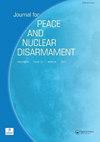拜登核态势评估及其对美国亚太盟友的启示
IF 1.4
Q4 INTERNATIONAL RELATIONS
引用次数: 0
摘要
美国总统拜登预计不久将发布新的《核态势评估报告》。这可能包括将减少核武器在美国军事战略中的作用作为一项政策目标。在此背景下,将讨论美国核威慑现代化问题。即使三位一体的陆基部分以某种方式被削弱,只要美国的整体核威慑能力被认为是保持不变的,美国就能够让其盟友放心。应该欢迎降低核武器在美国整体军事学说中的作用。从这个意义上讲,即使一些日本官员和专家可能会反对,但不首先使用核武器或只用于核武器的政策也应该受到欢迎。减少核武器的作用需要加强常规威慑,除非全面的安全局势得到改善- -这一点在日本没有得到很好的认识。这种转变对日本来说并不容易,因为日本几十年来的经济增长一直很低,国防开支实际上被限制在国民生产总值(gdp)的1%左右。美国对-à-vis《禁止核武器条约》的立场将引起日本的注意,日本对该条约有相当大的支持。本文章由计算机程序翻译,如有差异,请以英文原文为准。
The Biden Nuclear Posture Review and Its Implications for US Asia-Pacific Allies
ABSTRACT US President Joe Biden is expected to issue a new Nuclear Posture Review report soon. It may include as a policy goal a reduction of the role of nuclear weapons in US military strategy. In that context, the issue of the modernization of the US nuclear deterrent will be addressed. Even if the land-based leg of the triad were somehow curtailed, the United States would be able to keep its allies reassured as long as its overall nuclear deterrence capability was perceived to be maintained. A reduction in the role of nuclear weapons in the overall US military doctrine should be welcomed. In that sense, adoption of a nuclear no-first-use or sole-purpose policy should also be welcomed even though some Japanese officials and experts may oppose it. Decreasing the role of nuclear weapons requires strengthening conventional deterrence unless the overall security situation is improved – a point that is not very well recognized in Japan. This shift will not be easy for Japan, where economic growth has been very low for decades and defense spending is virtually capped at around 1% of the gross national product. The US stance vis-à-vis the Treaty on the Prohibition of Nuclear Weapons will draw attention in Japan, where there is considerable support for the treaty.
求助全文
通过发布文献求助,成功后即可免费获取论文全文。
去求助
来源期刊

Journal for Peace and Nuclear Disarmament
INTERNATIONAL RELATIONS-
CiteScore
1.30
自引率
0.00%
发文量
36
审稿时长
12 weeks
 求助内容:
求助内容: 应助结果提醒方式:
应助结果提醒方式:


